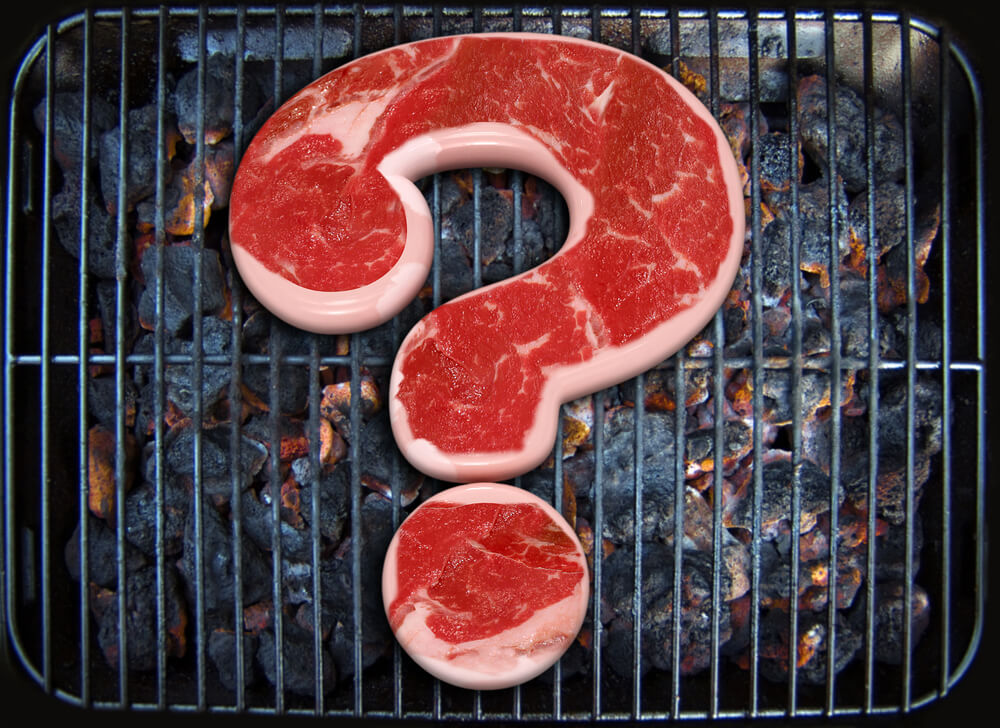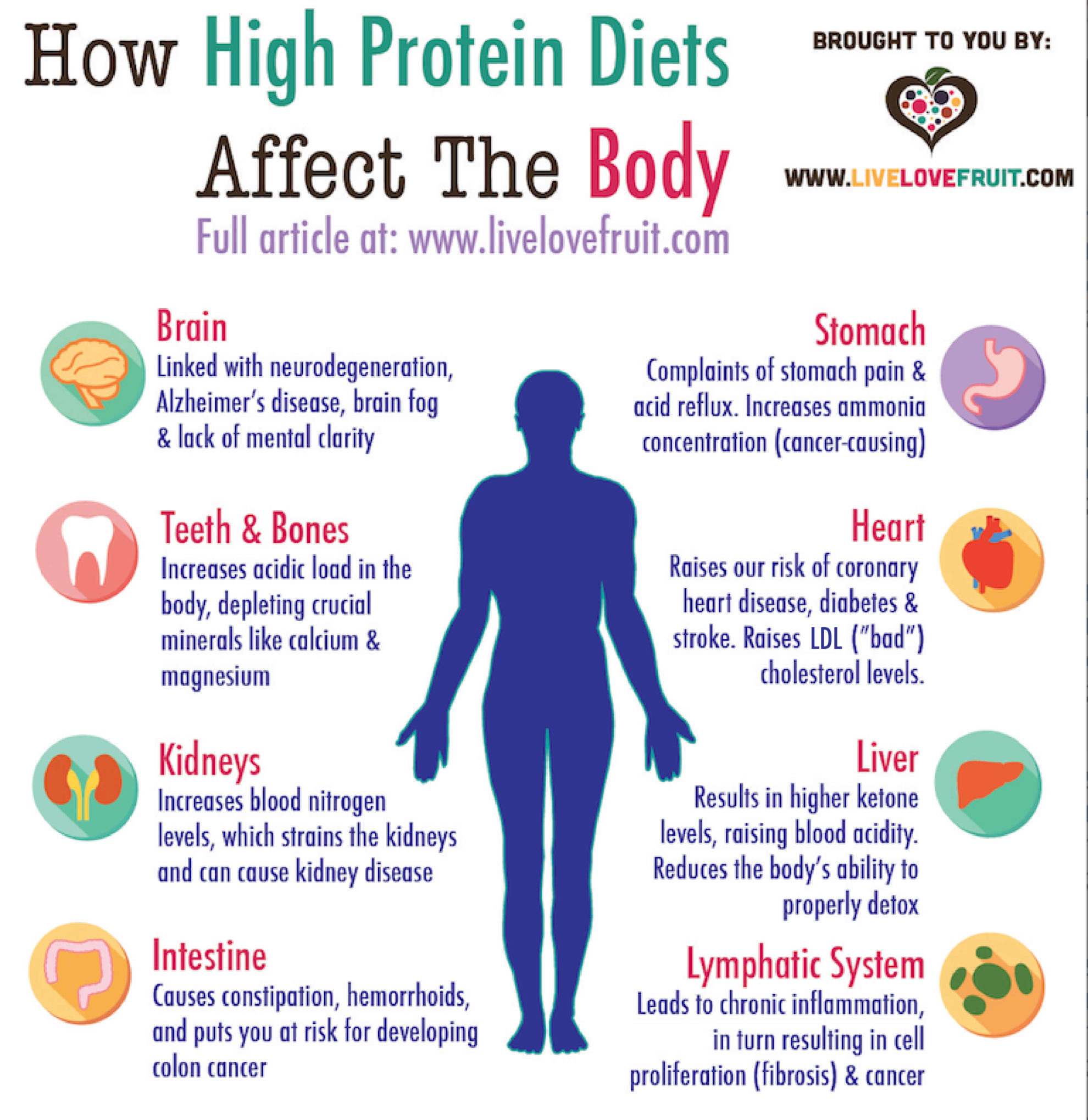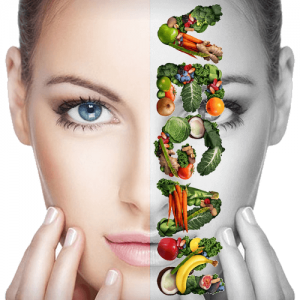
If you follow an Atkins, Paleo or Dunkan diet, you may want to reconsider it! Eating too much protein can increase our risk for a variety of different health conditions – in fact, a new study has shown that they could be as bad for you as smoking!
Not only did animal proteins (meat, eggs, and dairy) increase participants’ risk of death by up to 74% (compared to their more low-protein counterparts), but even when controlling for a high amount of fat and carbs in their diet, consuming a high amount of animal protein had negative health effects. These individuals were also several times more likely to die of diabetes.
Aim for around 10% of your total calories coming from protein. As long as one is eating a variety of plant foods in sufficient quantity to maintain one’s weight, it is nearly impossible to be protein deficient (yes, even on a raw vegan or vegan (cooked) food diet). The body gets plenty of protein from the amino acids in fruit and vegetables, just enough to create a healthy, strong body.
So how does a high-protein diet affect the body?

Brain
High-protein diets have been linked with lighter brain weight (neurodegeneration), and large protein concentrations circulating in the blood make the brain more vulnerable to the devastating effect of plaques, speeding up cell death. Diseases like Alzheimer’s may be avoidable simply by eating a low-fat plant-based diet, rich with a variety of ripe fruit and vegetables (which has been found to actually reduce our risk of dementia).
Consuming diets high in animal protein also makes us more susceptible to brain fog, lack of mental clarity and dampened memory.
Cardiovascular System
The American Heart Association doesn’t recommend high-protein diets. High-protein animal foods are high in saturated fat, which when eaten in excess and for a sustained period of time, raises our risk of coronary heart disease, diabetes, stroke, and a variety of cancer types.
Many high-protein diets also de-emphasize high-carbohydrate, high-fibre plant foods, which are rich in vitamins, minerals, essential fatty acids and other phytonutrients our body depends on to strengthen our immune system and defend against disease and illness. Reducing consumption of these foods usually means other, higher-fat foods are eaten instead, thus raising cholesterol levels even more and increasing cardiovascular risk.
Kidneys
Consuming lots of animal proteins can lead to a reduction in kidney function. When people eat too much protein, they take in more nitrogen than they need. When you have too much nitrogen floating around in your body, the kidneys get strained because the only way we can expel it is via urination. People with kidney disease are actually encouraged to eat lower-protein diets to help reduce excess nitrogen levels and to help prevent kidney disease (so why not just skip this altogether, and consume less protein heavy foods aka. animal products?).
Liver
The liver is our filter. Everything you eat and breathe passes through the liver to be cleared of toxins. When we continuously eat protein-heavy foods like meat, eggs, and dairy, and reduce our consumption of carbs, our body goes into a state of ketosis. Ketosis is when the liver converts fats into fatty acids for use as energy and the by-product, ketones. Ketones increase blood acidity, which is the complete opposite of alkalinity, and can lead to a diseased body (and a particularly stressed liver).
A high protein diet, particularly derived from animal protein, is not the best for the liver. Certain proteins are converted into ammonia (a toxic metabolic product) by the bacteria in our intestine, and this ammonia must be broken down by the liver and made into urea which is then excreted by the kidneys. Too much ammonia (aka. too much protein-heavy foods) can lead to a weak liver, or certain liver disorders.
Lymphatic System
According to Dr. Vodder (writer of Manual Lymph Drainage: A Practical Guide), “all protein molecules leave the bloodstream within 24-48 hours, enter the connective tissue, and most of them are returned to the bloodstream via the lymphatic vascular system, so the term “protein circulation” is justified.”
“..the protein circulation needs a properly functioning lymphatic vascular system: otherwise there will be blockages and build-ups in the connective tissue, that is, the concentration of protein in the tissue will rise. This will lead to chronic inflammation, which in its turn will result in cell proliferation (fibrosis).”
Protein in your diet is blamed as a contributing factor: “If the blood protein concentration is too high, e.g., due to a protein-rich meal, various mechanisms of the endothelial cells of the blood capillaries will cause the protein to be released into the tissue in order to maintain homeostasis.”
Thus, during digestion, the molecules of protein go to your connective tissue via the bloodstream, which is next absorbed by the lymphatic system. This is a major reason to avoid high-protein diets.
Teeth & Bones
Too much protein is not good for our bones. Meat and other protein-heavy animal products like eggs and dairy, contain high levels of sulfur-containing amino acids which promote acid production. This increases acidic load in the body, and to help buffer the acid, the body naturally draws on alkaline reserves in our bones to balance our pH level. These alkaline reserves include things like calcium and magnesium, which are needed to help keep our bones and teeth healthy and strong.
Essentially, a high-protein diet is a high-acid diet, which sets us up for weak and brittle bones, and developing osteoporosis later in life.
Stomach
Stomach pain and acid reflux are two common issues of consuming a diet high in animal-derived proteins. Consuming too much protein (whether from animal or vegetable sources – aka. seeds, nuts, beans and grains) will result in decomposition in the stomach, converting into poisonous ammonia. This ammonia in turn produces nitrosamines which are one of the most “potent, cancer-causing chemicals known.” (Dr. Lijinsky).
Intestine
Too much protein and not enough fibre can cause incredible amounts of constipation. Dehydration caused by ketosis and limited carbs, combined with lack of fibre will have you squatting on the toilet for days. Not only that, but diets high in meat can cause hemorrhoids (that isn’t too sexy now is it?).
High protein diets also put you at risk for developing colon cancers and polyps in the intestine. If you want to have smooth bowel flow, consume a high-raw, plant-based vegan diet. Not only will you become more regular, but you will also have wonderful smelling bowel movements (trust me, I would know!).
Sources:
http://news.usc.edu/59199/meat-and-cheese-may-be-as-bad-for-you-as-smoking/
http://www.nature.com/ejcn/journal/v61/n5/abs/1602557a.html
http://www.eurekalert.org/pub_releases/2014-03/uosc-mac022814.php
http://www.dailymail.co.uk/health/article-1221752/High-protein-diets-shrink-brain-boost-risk-Alzheimers.html
http://www.heart.org/HEARTORG/GettingHealthy/NutritionCenter/High-Protein-Diets_UCM_305989_Article.jsp
http://www.pcrm.org/health/diets/vsk/vegetarian-starter-kit-protein
http://www.nlfindia.com/patients/diet_nutrition.asp








From greens ! Spinach alone has 30% protein ! check it up 🙂
Yeah, the infographic should probably say from “animal proteins.” Plant proteins (as far as I’ve seen), don’t have these effects or haven’t been studied enough to determine they have these effects. Considering the wild reversal of disease that happens when people eat a ton of whole plant based foods, I’d say it doesn’t. But thanks for sharing! I’m going to use this graphic for some people I’m helping to transition. 🙂
You’re right Kim! Plant-based proteins have a much different effect than animal proteins, and that is basically the message I was trying to send. Thanks for using the graphic! 🙂
I just wanted to let you know that your chart on negative effects of high protein is in accurate.
You list HDL as "bad" cholesterol and accurately it is the "good" cholesterol.
LDL (low density lipids) is the bad cholesterol.
This makes me doubtful about the validity of your information on high protein diets and this is something any credible medical person would get right?
Hey Ron – I must apologize, as I made this infographic years ago, and that typo completely slipped my mind. I will be getting that infographic changed by the end of this week. Thanks for bringing it to my attention. Again, I apologize.
Actually, the science behind HDL is not conclusive enough to call it a “good” cholesterol. https://www.health.harvard.edu/heart-health/rethinking-good-cholesterol
Thanks Kim – I think the take-home message is to just stop consuming foods that raise your cholesterol, period. 😉